Unit2(大学英语读写译4课文翻译)
英语读写译4课文翻译[整理版]
![英语读写译4课文翻译[整理版]](https://img.taocdn.com/s3/m/9ddacf0d11a6f524ccbff121dd36a32d7375c717.png)
英语读写译4课文翻译第二版新视野大学英语读写教程第四册课文翻译Unit 1 text A名气之尾艺术家追求成名,如同狗自逐其尾,一旦追到手,除了继续追逐不知还能做些什么。
成功之残酷正在于它常常让那些追逐成功者自寻毁灭。
对一名正努力追求成功并刚刚崭露头角的艺术家,其亲朋常常会建议“正经的饭碗不能丢!”他们的担心不无道理。
追求出人头地,最乐观地说也困难重重,许多人到最后即使不是穷困潦倒,也是几近精神崩溃。
尽管如此,希望赢得追星族追捧和同行赞扬之类的不太纯洁的动机却在激励着他们向前。
享受成功的无上光荣,这种诱惑不是能轻易抵挡的。
成名者之所以成名,大多是因为发挥了自己在歌唱、舞蹈、绘画或写作等方面的特长,并能形成自己的风格。
为了能迅速走红,代理人会极力吹捧他们这种风格。
他们青云直上的过程让人看不清楚。
他们究竟是怎么成功的,大多数人也都说不上来。
尽管如此,艺术家仍然不能闲下来。
若表演者、画家或作家感到无聊,他们的作品就难以继续保持以前的吸引力,也就难以保持公众的注意力。
公众的热情消磨以后,就会去追捧下一个走红的人。
有些艺术家为了不落伍,会对他们的写作、跳舞或唱歌的风格稍加变动,但这将冒极大的失宠的危险。
公众对于他们藉以成名的艺术风格以外的任何形式都将不屑一顾。
知名作家的文风一眼就能看出来,如田纳西?威廉斯的戏剧、欧内斯特?海明威的情节安排、罗伯特?弗罗斯特或 T.S.艾略特的诗歌等。
同样,像莫奈、雷诺阿、达利这样的画家,希区柯克、费里尼、斯皮尔伯格、陈凯歌或张艺谋这样的电影制作人也是如此。
他们鲜明独特的艺术风格标志着与别人不同的艺术形式上的重大变革,这让他们名利双收,但也让他们付出了代价,那就是失去了用其他风格或形式表现自我的自由。
名气这盏聚光灯可比热带丛林还要炙热。
骗局很快会被揭穿,过多的关注带来的压力会让大多数人难以承受。
它让你失去自我。
你必须是公众认可的那个你,而不是真实的你或是可能的你。
艺人,就像政客一样,必须常常说些违心或连自己都不完全相信的话来取悦听众。
大学英语精读第二册1-4课文翻译
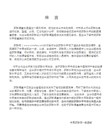
学校是一座装着大窗(xue2 xiao4 shi4 yi1 zuo4 zhuang1 zhe0 da4 chuang1)户的红砖房子。前庭园是个铺着沙砾的正方形:四个角上各有嘶丛冬青灌木,它们经受着从繁忙的大街上吹来的尘烟,挣扎着活下去。
1826年7月4日,正值美国独立㈤十周年纪念日之际,杰斐逊与世长辞了。他给他的同胞留下了一份丰富的思想遗产和众多的榜样。托马斯·杰斐逊对美国的教育事业作出了巨大的贡献,他认为,只有受过教育的人民组成的国家才能保持自由。
Unit3 My First Job
为了想在进大学前赚些钱,作者申请了一份教职。但面试情况却越来越糟……
杰斐逊已谢世很久,但他的许多思想仍使我们很感兴趣。
杰斐逊的遗训 布鲁斯·布利文
美国第㈢任总统托马斯·杰斐逊也许不像乔治·华胜顿和锨伯拉罕·林肯那样著名,但大多数人至少记得有关他的一件事实:是他写的《独立宣言》。
虽然杰斐逊生活在二百多年以前,但我们今天仍可以从他身上学到很多东西。他的许多思想对当代青年来说特别有蒜义。下面就是他讲过和写过的一些观点:
自己作判断。未经过认真的思考,杰斐逊绝不接受别人的意见。他在给侄子的信中写道:“不要因为别的人相信或拒绝了什么东西,你也就去相信它或拒绝它。上帝赐予你一个用来判断真理和谬误的头脑。那你就运用它吧。”
杰斐逊觉得,人民“是彻底可以信赖的,应该让他们听到一切真实和虚伪的东西,然后作出正确的判断。倘使让我来决定,我们是应该有嘶个政府而不要报纸呢还是应该有报纸而不要政府,我会毫不犹豫地选择后者。”
(第二版)新视野大学英语读写教程第四册unit2中文翻译
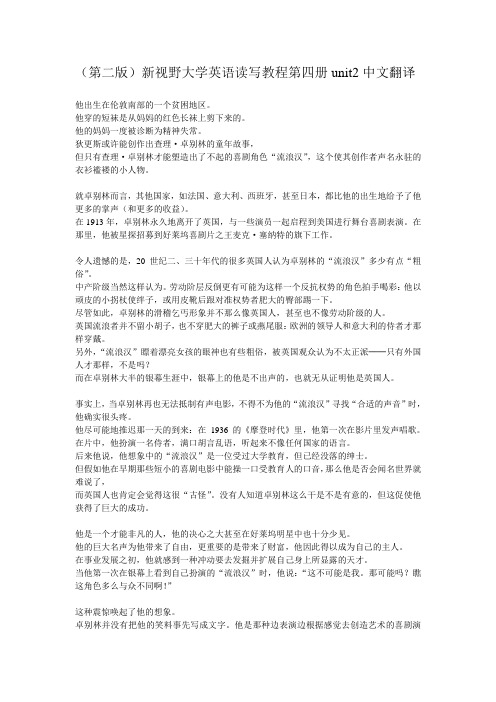
(第二版)新视野大学英语读写教程第四册unit2中文翻译他出生在伦敦南部的一个贫困地区。
他穿的短袜是从妈妈的红色长袜上剪下来的。
他的妈妈一度被诊断为精神失常。
狄更斯或许能创作出查理·卓别林的童年故事,但只有查理·卓别林才能塑造出了不起的喜剧角色“流浪汉”,这个使其创作者声名永驻的衣衫褴褛的小人物。
就卓别林而言,其他国家,如法国、意大利、西班牙,甚至日本,都比他的出生地给予了他更多的掌声(和更多的收益)。
在1913年,卓别林永久地离开了英国,与一些演员一起启程到美国进行舞台喜剧表演。
在那里,他被星探招募到好莱坞喜剧片之王麦克·塞纳特的旗下工作。
令人遗憾的是,20世纪二、三十年代的很多英国人认为卓别林的“流浪汉”多少有点“粗俗”。
中产阶级当然这样认为。
劳动阶层反倒更有可能为这样一个反抗权势的角色拍手喝彩:他以顽皮的小拐杖使绊子,或用皮靴后跟对准权势者肥大的臀部踢一下。
尽管如此,卓别林的滑稽乞丐形象并不那么像英国人,甚至也不像劳动阶级的人。
英国流浪者并不留小胡子,也不穿肥大的裤子或燕尾服:欧洲的领导人和意大利的侍者才那样穿戴。
另外,“流浪汉”瞟着漂亮女孩的眼神也有些粗俗,被英国观众认为不太正派──只有外国人才那样,不是吗?而在卓别林大半的银幕生涯中,银幕上的他是不出声的,也就无从证明他是英国人。
事实上,当卓别林再也无法抵制有声电影,不得不为他的“流浪汉”寻找“合适的声音”时,他确实很头疼。
他尽可能地推迟那一天的到来:在1936 的《摩登时代》里,他第一次在影片里发声唱歌。
在片中,他扮演一名侍者,满口胡言乱语,听起来不像任何国家的语言。
后来他说,他想象中的“流浪汉”是一位受过大学教育,但已经没落的绅士。
但假如他在早期那些短小的喜剧电影中能操一口受教育人的口音,那么他是否会闻名世界就难说了,而英国人也肯定会觉得这很“古怪”。
没有人知道卓别林这么干是不是有意的,但这促使他获得了巨大的成功。
新视野大学英语读写教程【第三版】第四册课文原文与翻译
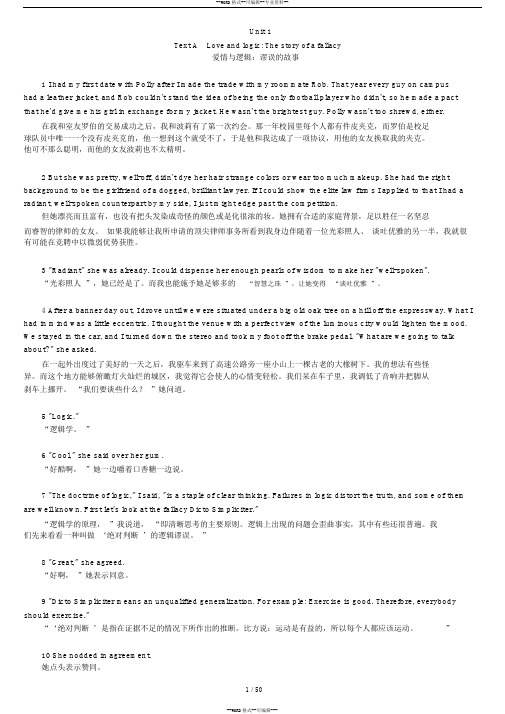
Unit 1Text A Love and logic: The story of a fallacy爱情与逻辑:谬误的故事1 I had my first date with Polly after I made the trade with my roommate Rob. That year every guy on campushad a leather jacket, and Rob couldn't stand the idea of being the only football player who didn't, so he made a pact that he'd give me his girl in exchange for my jacket. He wasn't the brightest guy. Polly wasn't too shrewd, either.在我和室友罗伯的交易成功之后,我和波莉有了第一次约会。
那一年校园里每个人都有件皮夹克,而罗伯是校足球队员中唯一一个没有皮夹克的,他一想到这个就受不了,于是他和我达成了一项协议,用他的女友换取我的夹克。
他可不那么聪明,而他的女友波莉也不太精明。
2 But she was pretty, well-off, didn't dye her hair strange colors or wear too much makeup. She had the right background to be the girlfriend of a dogged, brilliant lawyer. If I could show the elite law firms I applied to that I had a radiant, well-spoken counterpart by my side, I just might edge past the competition.但她漂亮而且富有,也没有把头发染成奇怪的颜色或是化很浓的妆。
新视野大学英语读写教程2课文翻译【1-10单元全】
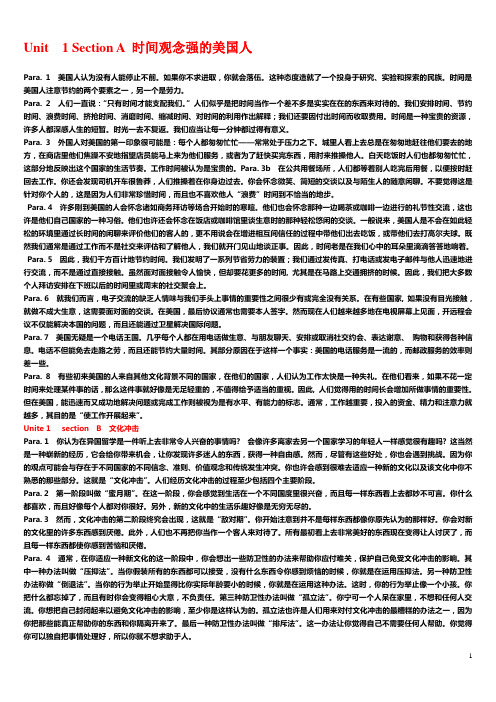
Unit 1 Section A 时间观念强的美国人Para. 1 美国人认为没有人能停止不前。
如果你不求进取,你就会落伍。
这种态度造就了一个投身于研究、实验和探索的民族。
时间是美国人注意节约的两个要素之一,另一个是劳力。
Para. 2 人们一直说:“只有时间才能支配我们。
”人们似乎是把时间当作一个差不多是实实在在的东西来对待的。
我们安排时间、节约时间、浪费时间、挤抢时间、消磨时间、缩减时间、对时间的利用作出解释;我们还要因付出时间而收取费用。
时间是一种宝贵的资源,许多人都深感人生的短暂。
时光一去不复返。
我们应当让每一分钟都过得有意义。
Para. 3 外国人对美国的第一印象很可能是:每个人都匆匆忙忙——常常处于压力之下。
城里人看上去总是在匆匆地赶往他们要去的地方,在商店里他们焦躁不安地指望店员能马上来为他们服务,或者为了赶快买完东西,用肘来推搡他人。
白天吃饭时人们也都匆匆忙忙,这部分地反映出这个国家的生活节奏。
工作时间被认为是宝贵的。
Para. 3b 在公共用餐场所,人们都等着别人吃完后用餐,以便按时赶回去工作。
你还会发现司机开车很鲁莽,人们推搡着在你身边过去。
你会怀念微笑、简短的交谈以及与陌生人的随意闲聊。
不要觉得这是针对你个人的,这是因为人们非常珍惜时间,而且也不喜欢他人“浪费”时间到不恰当的地步。
Para. 4 许多刚到美国的人会怀念诸如商务拜访等场合开始时的寒暄。
他们也会怀念那种一边喝茶或咖啡一边进行的礼节性交流,这也许是他们自己国家的一种习俗。
他们也许还会怀念在饭店或咖啡馆里谈生意时的那种轻松悠闲的交谈。
一般说来,美国人是不会在如此轻松的环境里通过长时间的闲聊来评价他们的客人的,更不用说会在增进相互间信任的过程中带他们出去吃饭,或带他们去打高尔夫球。
既然我们通常是通过工作而不是社交来评估和了解他人,我们就开门见山地谈正事。
因此,时间老是在我们心中的耳朵里滴滴答答地响着。
Para. 5 因此,我们千方百计地节约时间。
(完整版)Unit2ThePowerofWords新编大学英语第二版第四册课文翻译
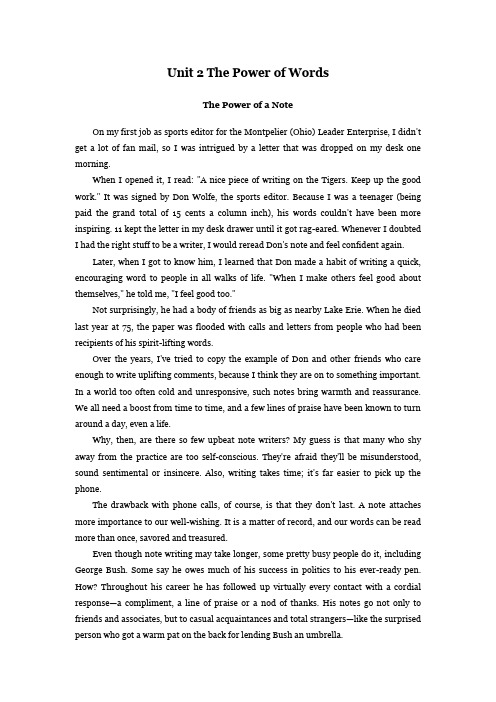
Unit 2 The Power of WordsThe Power of a NoteOn my first job as sports editor for the Montpelier (Ohio) Leader Enterprise, I didn't get a lot of fan mail, so I was intrigued by a letter that was dropped on my desk one morning.When I opened it, I read: "A nice piece of writing on the Tigers. Keep up the good work." It was signed by Don Wolfe, the sports editor. Because I was a teenager (being paid the grand total of 15 cents a column inch), his words couldn't have been more inspiring. 11 kept the letter in my desk drawer until it got rag-eared. Whenever I doubted I had the right stuff to be a writer, I would reread Don's note and feel confident again.Later, when I got to know him, I learned that Don made a habit of writing a quick, encouraging word to people in all walks of life. "When I make others feel good about themselves," he told me, "I feel good too."Not surprisingly, he had a body of friends as big as nearby Lake Erie. When he died last year at 75, the paper was flooded with calls and letters from people who had been recipients of his spirit-lifting words.Over the years, I've tried to copy the example of Don and other friends who care enough to write uplifting comments, because I think they are on to something important. In a world too often cold and unresponsive, such notes bring warmth and reassurance. We all need a boost from time to time, and a few lines of praise have been known to turn around a day, even a life.Why, then, are there so few upbeat note writers? My guess is that many who shy away from the practice are too self-conscious. They're afraid they'll be misunderstood, sound sentimental or insincere. Also, writing takes time; it's far easier to pick up the phone.The drawback with phone calls, of course, is that they don't last. A note attaches more importance to our well-wishing. It is a matter of record, and our words can be read more than once, savored and treasured.Even though note writing may take longer, some pretty busy people do it, including George Bush. Some say he owes much of his success in politics to his ever-ready pen. How? Throughout his career he has followed up virtually every contact with a cordial response—a compliment, a line of praise or a nod of thanks. His notes go not only to friends and associates, but to casual acquaintances and total strangers—like the surprised person who got a warm pat on the back for lending Bush an umbrella.Even top corporate managers, who have mostly affected styles of leadership that can be characterized only as tough, cold and aloof, have begun to learn the lesson, and earn the benefits, of writing notes that lift people up. Former Ford chairman Donald Peterson, who is largely credited for turning the company round in the 1980s, made it a practice to write positive messages to associates every day. "I'd just scribble them on a memo pad or the corner of a letter and pass them along," he says. "The most important ten minutes of your day are those you spend doing something to boost the people who work for you."Too often," he observed, "people we genuinely like have no idea how we feel about them. Too often we think, I haven't said anything critical; why do I have to say something positive? We forget that human beings need positive reinforcement—in fact, we thrive on it!"What does it take to write letters that lift spirits and warm hearts? Only a willingness to express our appreciation. The most successful practitioners include what I call the four "S's" of note writing.1) They are sincere. No one wants false praise.2) They are usually short. If you can't say what you want to say in three sentences, you're probably straining3) They are specific. Complimenting a business colleague by telling him "good speech" is too vague; "great story about Warren Buffet's investment strategy" is precise.4) They are spontaneous. This gives them the freshness and enthusiasm that will linger in the reader's mind long afterward.It's difficult to be spontaneous when you have to hunt for letter-writing materials, so I keep paper, envelopes and stamps close at hand, even when I travel. Fancy stationery isn't necessary; it's the thought that counts.So, who around you deserves a note of thanks or approval? A neighbor, your librarian, a relative, your mayor, your mate, a teacher, your doctor? You don't need to be poetic. If you need a reason, look for a milestone, the anniversary of a special event you shared, or a birthday or holiday. For the last 25 years, for example, I've prepared an annual Christmas letter for long-distance friends, and I often add a handwritten word of thanks or congratulations. Acknowledging some success or good fortune that has happened during the year seems particularly appropriate considering the spirit of the Christmas season.Be generous with your praise. Superlatives like "greatest," "smartest," "prettiest" make us all feel good. Even if your praise is a little ahead of reality, remember that expectations are often the parents of dreams fulfilled.Today I got a warm, complimentary letter from my old boss and mentor, Norman Vincent Peale. His little note to me was full of uplifting phrases, and it sent me to my typewriter to compose a few overdue letters of my own. I don't know if they will make anybody else's day, but they made mine. As my friend Don Wolfe said, making others feel good about themselves makes me feel good too.便笺的力量1 我当体育编辑,最早是为蒙比利埃(俄亥俄州)的《企业导报》工作,当时我很少收到体育迷的来信。
21世纪大学英语读写教程(四)unit2课文原文及翻译
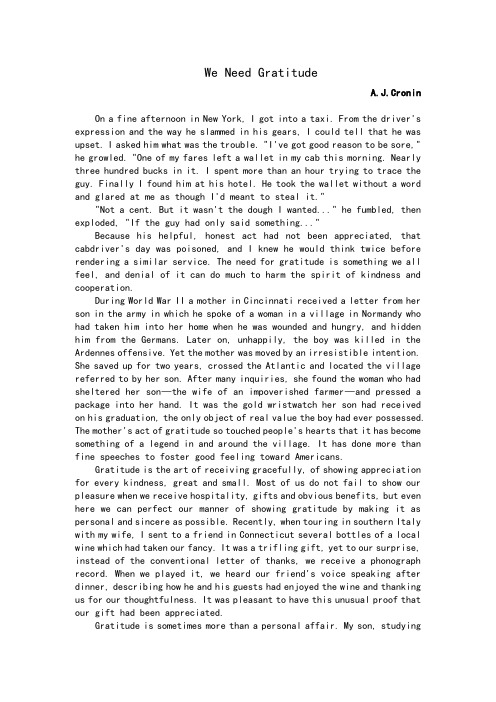
We Need GratitudeA.J.CroninOn a fine afternoon in New York, I got into a taxi. From the driver's expression and the way he slammed in his gears, I could tell that he was upset. I asked him what was the trouble. "I've got good reason to be sore," he growled. "One of my fares left a wallet in my cab this morning. Nearly three hundred bucks in it. I spent more than an hour trying to trace the guy. Finally I found him at his hotel. He took the wallet without a word and glared at me as though I'd meant to steal it.""Not a cent. But it wasn't the dough I wanted..." he fumbled, then exploded, "If the guy had only said something..."Because his helpful, honest act had not been appreciated, that cabdriver's day was poisoned, and I knew he would think twice before rendering a similar service. The need for gratitude is something we all feel, and denial of it can do much to harm the spirit of kindness and cooperation.During World War II a mother in Cincinnati received a letter from her son in the army in which he spoke of a woman in a village in Normandy who had taken him into her home when he was wounded and hungry, and hidden him from the Germans. Later on, unhappily, the boy was killed in the Ardennes offensive. Yet the mother was moved by an irresistible intention. She saved up for two years, crossed the Atlantic and located the village referred to by her son. After many inquiries, she found the woman who had sheltered her son—the wife of an impoverished farmer—and pressed a package into her hand. It was the gold wristwatch her son had received on his graduation, the only object of real value the boy had ever possessed. The mother's act of gratitude so touched people's hearts that it has become something of a legend in and around the village. It has done more than fine speeches to foster good feeling toward Americans.Gratitude is the art of receiving gracefully, of showing appreciation for every kindness, great and small. Most of us do not fail to show our pleasure when we receive hospitality, gifts and obvious benefits, but even here we can perfect our manner of showing gratitude by making it as personal and sincere as possible. Recently, when touring in southern Italy with my wife, I sent to a friend in Connecticut several bottles of a local wine which had taken our fancy. It was a trifling gift, yet to our surprise, instead of the conventional letter of thanks, we receive a phonograph record. When we played it, we heard our friend's voice speaking after dinner, describing how he and his guests had enjoyed the wine and thanking us for our thoughtfulness. It was pleasant to have this unusual proof that our gift had been appreciated.Gratitude is sometimes more than a personal affair. My son, studyingmedicine at McGill University, told me of a patient brought into hospital in Montreal whose life was saved by a blood transfusion. When he was well again he asked: "Isn't there any way I can discover the name of the donor and thank him?" He was told that names of donors are never revealed. A few weeks after his discharge he came back to give a pint of his own blood. Since then he has returned again and again for the same purpose. When a surgeon commented on this splendid record of anonymous service, he answered simply: "Someone I never knew did it for me. I'm just saying 'thanks'".It is a comforting thought that gratitude can be not merely a passing sentiment but a renewal which can, in some instances, persist for a lifetime. A husband who recalls appreciatively some generous or unselfish act on his wife's part, or a wife who never forgets the gifts her husband has given her, does much to keep the domestic wheels spinning smoothly. W.H. Hudson, British author and naturalist, has written: "One evening I brought home a friend to share our usual evening meal. Afterward he said to me:‘you are fortunate to have a wife who, despite ill health and children to look after, cooks such excellent meals.' That tribute opened my eyes and taught me to show gratitude for my wife's day-to-day heroism, which I had hitherto taken for granted."It is, above all, in the little things that the grace of gratitude should be most employed. The boy who delivers our paper, the milkman, the mailman, the barber, the waitress at a restaurant, the elevator operator —all oblige us in one way or another. By showing our gratitude we make routine relationships human and render monotonous tasks more agreeable.A patient of mine in London who worked as a bus conductor once confided to me, "I get fed up with my job sometimes. People grumble, bother you, haven't got the right change for their tickets. But there's one lady on my bus morning and evening, and she always thanks me in a particularly friendly way when I take her ticket. I like to think she's speaking for all the passengers. It helps me to keep smiling."Arnold Bennett had a publisher who boasted about the extraordinary efficiency of his secretary. One day Bennett said to her, "Your employer claims that you are extremely efficient. What is your secret?" "It's not my secret," the secretary replied. "It's his." Each time she performed a service, no matter how small, he never failed to acknowledge it. Because of that she took infinite pains with her work.Some persons refrain from expressing their gratitude because they feel it will not be welcome. A patient of mine, a few weeks after his discharge from the hospital, came back to thank his nurse. "I didn't come back sooner," he explained, "because I imagined you must be bored to death with people thanking you.""On the contrary," she replied, "I am delighted you came. Few realize how much we need encouragement and how much we are helped by those whogive it."Gratitude is something of which none of us can give too much. For on the smiles, the thanks we give, our little gestures of appreciation, our neighbors build up their philosophy of life.一个晴朗的下午,我在纽约上了一辆出租车。
21世纪大学英语读写教程第四册课文翻译

如今,研究者们有证据证明,对工作的内在热情是出类拔萃的一个关键。现任哈佛大学工商管理教授特蕾莎?阿玛贝尔1985年在布兰代斯大学主持的一项研究中,要求一批专业作家----其中没有一位是有名气的----各写一首短诗。当时每位作家被随机分别编到三个小组中:一个小组要求记住是为金钱而写;另一个小组要求想着只为消遣而写;第三个小组则没有给任何指示。
因此,商人一般当不了好领袖。他们往往是实用主义者,他们认为一旦你说明了某件事情有道理,人们就会去做。但是历史表明这种想法是错误的。当时世变得艰难时,人们不想被得知出了什么问题,不想听人训斥,不想了解许多他们不懂的复杂数据和计划(比如卡特的能源政策)。他们想要受到感动、得到鼓舞、有人激励、有人安慰、感到振奋---总而言之,想有人来领导!
首先,他必须使我们的愿望变得崇高,让我们相信我们正在参与创造伟大的历史,并赋予我们一种荣誉感。温斯顿?丘吉尔通过纯粹的修辞艺术,把英国的失败和1940年的敦刻尔克大撤退变成了大胜利。富兰克林?D?罗斯福的话把美国舰队在珍珠港的沉没变成了动员全国的战斗口号,而不是不光彩的国耻。领袖必须激发我们的热情,而不是唤起我们的理性。
一位中国哲人曾经说过,领袖必须具备优秀舞蹈家的风度,这话很有道理。领袖应该知道如何显得轻松自信。他的步态应该坚定果断。他应该像林肯、罗斯福、杜鲁门、艾克和肯尼迪那样会纵情欢笑,而不是个像尼克松或卡特那样笑得龇牙咧嘴、令人恶心算是心情不错。罗纳德?里根受过的演技训练在他跟卡特的辩论中显示出了良好的效果。他以潇洒自如的举止和显而易见的和蔼可亲成功地给人一种印像,即他事实上是总统而卡特是挑战者。
- 1、下载文档前请自行甄别文档内容的完整性,平台不提供额外的编辑、内容补充、找答案等附加服务。
- 2、"仅部分预览"的文档,不可在线预览部分如存在完整性等问题,可反馈申请退款(可完整预览的文档不适用该条件!)。
- 3、如文档侵犯您的权益,请联系客服反馈,我们会尽快为您处理(人工客服工作时间:9:00-18:30)。
Unit 2Text ATechnology and Happiness技术与幸福Para. 11.In the 20 th century, Americans, Europeans, and East Asians enjoyed material and technological advances that were unimaginable in previous eras.=20 世纪的美国人、欧洲人和东亚人都享受到了过去历代人都无法想象的物质和技术进步所带来的乐趣。
2.In the United States, for instance, gross domestic product per capita tripled from 1950 to 2000. = 譬如,在美国,从1950 年到2000 年,人均国民生产总值翻了3 倍。
3.Life expectancy soared. =人的寿命大幅度提高。
4.The boom in productivity after World War II made goods better and cheaper at the same time. =二战后生产力的迅速发展使商品物美价廉。
5.Things that were once luxuries, such as jet travel and long-distance phone calls, became necessities.=诸如乘飞机旅行和打长途电话等曾经是奢侈的事情成了生活中不可或缺的一部分。
6.And even though Americans seemed to work extraordinarily hard, their pursuit of entertainment turned media and leisure into multibillion-dollar industries.=即使美国人工作时似乎是格外勤奋努力的,可他们对娱乐的追求却使得他们将媒体和闲暇转变成了盈利数十亿美元的产业。
Para. 21.By most standards, then, you would have to say that Americans are better off now than they were in the middle of the last century.=那么,根据大多数标准衡量,你会说,现在的美国人比上个世纪中叶富裕得多。
2.Oddly, though, if you ask Americans how happy they are, you find that they are no happier than they were in 1946 (which is when formal surveys of happiness started). = 然而,奇怪的是,如果你问美国人有多幸福,你会发现,他们并不比1946 年时幸福( 1946年正式开始对幸福状况进行调查) 。
3.In fact, the percentage of people who say they are “very happy ” has fallen slightly since the early 1970s even though the income of people born in 1940 has, on average, increased by 116 percent over the course of their working lives.=事实上,那些说自己“非常幸福”的人所占的比例自20 世纪70 年代早期以来一直稳中有降——尽管20 世纪40 年代出生的人的收入在他们的工作生涯中平均增长了116% 。
4.You can find similar data for most developed countries. =你可以在大多数发达国家找到相似的数据。
Para. 31.The relationship between happiness and technology has been an eternal subject for social critics and philosophers since the advent of the Industrial Revolution.=自工业革命出现以来,幸福与技术之间的关系一直是社会批评家和哲学家们长期研究的课题。
2.But it 's been left largely unexamined by economists and social scientists. =然而,这个课题基本上还没有受到经济学家和社会科学家们的关注。
3.The truly groundbreaking work on the relationship between prosperity and well-being was done by the economist Richard Easterlin, who in 1974 wrote a famous paper entitled “Does Economic Growth Improve the Human Lot? ” =经济学家理查德·伊斯特林在经济繁荣和幸福的关系方面进行了具有开拓性的研究,并于1974 年发表了一篇题为“经济增长改变人类命运吗?”的著名论文。
4.Easterlin showed that when it came to developed countries, there was no real correlation between a nation's income level and its citizens ' happiness.=伊斯特林表明,就发达国家而言,一个国家的收入和国民的幸福之间并没有真正的相互关系。
5.Money, Easterlin argued, could not buy happiness at least not after a certain point.= 伊斯特林认为,金钱买不到幸福——至少金钱达到了一定程度以后是如此。
6.Easterlin showed that though poverty was strongly correlated with misery, once a country was solidly middle-class, getting wealthier did not seem to make its citizens any happier. =伊斯特林表明,尽管贫穷与苦难密不可分,但是,一个国家一旦达到稳定的中产阶级水平,更富有一些似乎就不会使其国民感到更多的幸福了。
Para. 41.This seems to be close to a universal phenomenon.=这近乎是一种普遍现象。
2.In fact, one of happiness scholar s ' most important insights is that people adapt very quickly to good news.=事实上,研究幸福的学者们最重要的观点之一是:人们对好消息很快便习以为常。
3.Take lottery winners for example. One famous study showed that although winners were very, very happy when they won, their extreme excitement quickly evaporated, and after a while their moods and sense of well-being were indistinguishable from what they had been before the victory. = 拿彩票中奖者为例吧。
一项重要的研究表明,尽管彩票中奖者中奖时会感到非常非常幸福,可这类兴奋很快就消逝了。
一段时间之后,他们的心情和幸福感与中奖之前并没什么区别。
Para. 51.So, too, with technology: no matter how dramatic a new innovation is, no matter how mucheasier it makes our lives, it is very easy to take it for granted.=人们对待技术的态度也是一样的:无论一种新事物多么引人注目,也无论它使我们的生活变得多么舒适,人们很快就会认为这是理所当然的事情。
2.You can see this principle at work in the world of technology every day, as things that once seemed miraculous soon become common and, worse, frustrating when they don 't work perfectly. =在技术世界里,你每天都会看到这一原则在发挥作用。
曾经一度被视为非常神奇的东西很快就变的习以为常,更糟的是,当这些东西运转不正常时,还会令人沮丧。
3.It 's hard, it turns out, to keep in mind what things were like before the new technology came along.=事实表明,要把新技术问世之前的情形牢记在心原来是如此困难!Para. 61.Does our fast assimilation of technological progress mean, then, that technology makes no difference?=那么,我们对新技术的快速吸收是否意味着技术没有发挥什么作用呢?2.No. It just makes the question of technology 's impact, for good or ill, more complicated. =不,决非如此。
不论好坏,这只是把技术对人类的影响的问题变得更复杂而已。
3.Let 's start with the downside. =让我们先从负面影响谈起吧。
